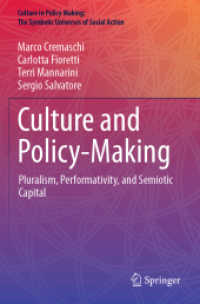Full Description
Explore an important, yet understudied conceptlearning. Taking a broad view, this volume explains how scholarly learning is defined and conceptualized by scholars. The authors synthesize the recent literature and organize the findings according to Boyer's four forms of scholarship (discovery, teaching, engagement, and integration). They then offer a counternarrative to faculty scholarly learning and the ways in which it is enacted and supported. Recommendations for developing, supporting, and evaluating faculty scholarly learning are also presented.This volume answers:What does scholarly learning look like at different types of institutions?What contexts and/or supports hinder or help faculty members' scholarly learning at the different institutional types?What challenges are noted in the extant literature on faculty work around further study or better understanding of faculty members' scholarly learning across institutional types?This is the second issue of the 43rd volume of the Jossey-Bass series ASHE Higher Education Report. Each monograph is the definitive analysis of a tough higher education issue, based on thorough research of pertinent literature and institutional experiences. Topics are identified by a national survey. Noted practitioners and scholars are then commissioned to write the reports, with experts providing critical reviews of each manuscript before publication.
Contents
Executive Summary 9Acknowledgements 12Foreword 13Introduction 16Challenges to Faculty Scholarly Learning 17Opportunities to Support Faculty Scholarly Learning 18Advancing Scholarly Learning Across Institution Types 20Monograph Purpose and Guiding Questions 20Monograph Overview 22Conceptualizing Scholarly Learning and Boyer's Forms of Scholarship 23Defining Learning 23Defining Scholarly Learning 24Significance of Scholarly Learning in the Academic Career 26Defining Boyer's Forms of Scholarship 27Conclusion: Connecting Scholarly Learning, Boyer, and Institutional Type 30Research Universities 31Defining Research Universities and Their Students and Faculty 31Mission 31Students 32Faculty 33Challenges 35Summary 37Faculty Scholarly Learning in Research Universities 37Scholarship of Discovery 38Scholarship of Teaching 40Scholarship of Engagement 42Scholarship of Integration 45Barriers to Scholarly Learning in Research Universities 46Valued Versus Rewarded 47Increased Demands for Competition and Productivity 47Academic Capitalism 48Opportunities for Scholarly Learning in Research Universities 49Scholarly Learning Through High-Impact Practices 49Increasing Opportunities for Collaboration with Internal and External Stakeholder 50Institutional Service to Support Scholarly Learning 50Conclusion and Implications 51Comprehensive Colleges and Universities 53Defining Comprehensives and Their Students and Faculty 53Mission 54Students 55Faculty 55Challenges 56Faculty Scholarly Learning at Comprehensives 57Scholarship of Discovery 59Scholarship of Teaching 60Scholarship of Engagement 62Scholarship of Integration 63Summary of Faculty Scholarly Learning in Comprehensives 63Barriers to Faculty Scholarly Learning at Comprehensives 64Workload Challenges 64Mission Confusion 65Faculty Members' Scholarly Learning Across Institutional Types 5Lack of Resources 66Opportunities for Faculty Scholarly Learning at Comprehensives 66Broadening Views of Scholarship for Comprehensive Faculty 66Developing an Infrastructure of Support 67Conclusion and Implications 68Liberal Arts Colleges 70Defining Liberal Arts Colleges and Their Students and Faculty 70Mission 70Students 72Faculty 72Challenges 75Summary 76Faculty Scholarly Learning in Liberal Arts Colleges 76Scholarship of Discovery 77Scholarship of Teaching 77Scholarship of Engagement 80Scholarship of Integration 80Barriers to Faculty Scholarly Learning in Liberal Arts Colleges 81Inaccurate Assumptions About Academic Work in LACs 82Inadequate Faculty Development Supports 83Disconnect Between Expectations and Reward/Incentive Structures 83Opportunities for Scholarly Learning in Liberal Arts Colleges 84Redefining Faculty Learning in LACs 84Modernizing Faculty Development Supports 85Aligning Policy and Practice 85Conclusions and Implications 86Community Colleges 88Defining Community Colleges and Their Students and Faculty 88Mission 89Students 90Faculty 90Challenges 93Summary 94Faculty Scholarly Learning at Community Colleges 94Scholarship of Discovery 95Scholarship of Teaching 96Scholarship of Engagement 98Scholarship of Integration 99Summary of Faculty Scholarly Learning in Community Colleges 100Barriers to Faculty Scholarly Learning at Community Colleges 100Heavy Teaching Loads 101Narrow Views of Scholarship 101Limited Resources and Infrastructures 102Opportunities for Faculty Scholarly Learning at Community Colleges 103Reducing Teaching Loads 103Expanding View of Scholarship 103Enhancing Resources and Infrastructures 104Conclusion and Implications 105A Call to Action: Advancing the Study of Faculty Scholarly Learning 107Synthesis of Key Findings and Implications 107Barriers to Scholarly Learning Across All Institution Types: Implications for Research 111Narrow Views of Academic Work and Scholarship 112Contradictory and Unclear Faculty Evaluation and Reward Systems 113Limited Organizational Support and Infrastructures 113Workload Issues 114Opportunities to Support Faculty Scholarly Learning Across All Institution Types: Implications for Practice 115Broadening or Expanding View of Scholarship 116Revisiting Workload and Reward Structures 117Improving Resources and Infrastructure 117Future Directions for Research and Scholarship 118Concluding Thoughts 119References 121Name Index 139Subject Index 145About the Authors 148







